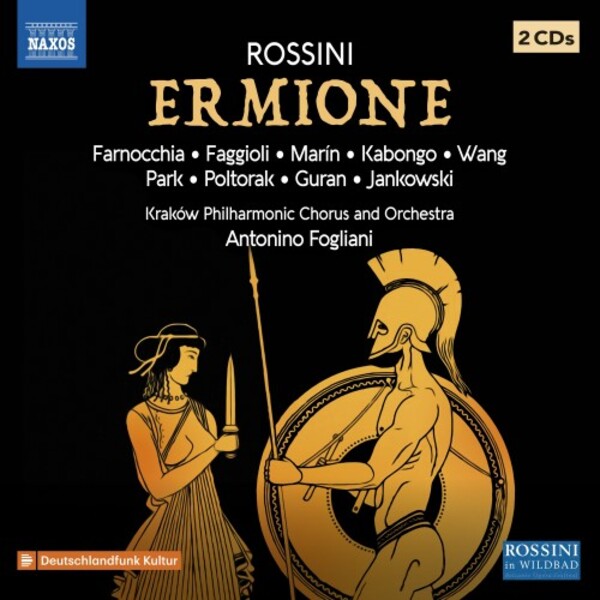ROSSINI Ermione (Fogliani)
View record and artist detailsRecord and Artist Details
Genre:
Opera
Label: Naxos
Magazine Review Date: 08/2024
Media Format: CD or Download
Media Runtime: 133
Mastering:
DDD
Catalogue Number: 8 660556-7

Tracks:
| Composition | Artist Credit |
|---|---|
| Ermione |
Gioachino Rossini, Composer
Antonino Fogliani, Conductor Aurora Faggioli, Andromaca, Mezzo soprano Bartosz Jankowski, Attalo, Tenor Chuan Wang, Pilade, Tenor Jusung Gabriel Park, Fenicio, Bass-baritone Katarzyna Guran, Cefisa, Soprano Krakow Philharmonic Chorus Krakow Philharmonic Orchestra Mariana Poltorak, Cleone, Soprano Moisés Marín, Pirro, Tenor Patrick Kabongo Mubenga, Oreste, Tenor Serena Farnocchia, Ermione, Soprano |
Author: Richard Osborne
This is the best recording we have yet had of Ermione, Rossini’s Classically inspired masterwork derived from Racine’s Andromaque, the great tragedian’s take on the aftermath of the Greeks’ sack of Troy and the destructive chain of unrequited passions it left in its wake. Written at white heat in Naples in 1819, the opera’s almost immediate neglect was of little concern to Rossini. He loved the piece and knew its quality.
The operatic world also began to love it after its revival in concert in Siena in 1977. The first commercial recording was made under Claudio Scimone’s direction in Monte Carlo in 1986 with as good a cast as was available at the time (Erato, 8/88). No edition was credited, though it was probably the one prepared for Siena from Rossini’s own carefully preserved manuscript and attendant orchestral sources by the late, great Giovanni Carli Ballola. The first performances of the official Critical Edition (Fondazione Rossini 1995, vocal score Casa Ricordi 2006) were given at the 1987 Pesaro Festival, with a rather too disarmingly flighty Monserrat Caballé in the title-role.
The defining revival came in a blazingly powerful concert performance in London’s Queen Elizabeth Hall in 1992, conducted by Mark Elder with Anna Caterina Antonacci as Ermione. As Max Loppert wrote in the Financial Times, it was a triumph for the work itself, this ‘high-wire mixture, perfectly balanced, of Classical form and Romantic passions that keep the drama unfolding at fever pitch’. Antonacci and the Oreste, Bruce Ford, repeated their roles at Glyndebourne in 1995 – an eccentric and dimly lit staging that transferred poorly to the small screen (NVC Arts, 6/06).
Loppert’s phrase about a drama that stays at fever pitch is shrewd. It’s what’s fatally lacking in Opera Rara’s otherwise worthy studio recording (12/10). Conversely, it’s the defining feature of this live 2022 Rossini in Wildbad performance. The conductor Antonino Fogliani holds the whole drama powerfully on course, as does the Ermione, Serena Farnocchia. Every inch the tigress at her first appearance, she, like Antonacci, sustains the role through the great 35-minute denouement, where she first orders, then regrets, the murder of Pirro by the already Fury-haunted Oreste.
Written for the virtuoso high tenor Giovanni David, the role of Oreste tends to burnish reputations, as here in a memorable performance by Congolese tenor Patrick Kabongo. Not so the role of Pirro, conceived for the great baritenor Andrea Nozzari. From that Siena revival onwards, its vocal and dramatic demands have mostly spelled trouble, as they do here for Spanish tenor Moisés Marín in Pirro’s initial confrontation with Ermione in the awkwardly written duetto ‘Non proseguir!’. But things improve. Marín has presence, copes well with the declamatory aspects of the role, and finds the attempted Act 2 wooing of Andromaca – the excellent Aurora Faggioli – a good deal easier to negotiate than that earlier confrontation with Ermione.
The several important comprimario roles are well taken, not least Milan-trained tenor Chuan Wang’s playing of Oreste’s kinsman Pilade. There are the usual irritants with these Wildbad recordings: too much mid-act applause (beer-hall ululations on occasion) and no text or translation. There is, however, a good synopsis, and collectors who own the Erato or Opera Rara recordings – to which this is now a necessary addition – will have them anyway.
The recording by Deutschlandfunk Kultur is first-rate. And it’s good to have the whole of Act 1 on a single CD, without an irritating break either within the Act 1 finale (Erato) or shortly before it (Opera Rara). Such continuity helps with the all-important task of keeping this harrowing music drama thrillingly on course.
Discover the world's largest classical music catalogue with Presto Music.

Gramophone Digital Club
- Digital Edition
- Digital Archive
- Reviews Database
- Full website access
From £8.75 / month
Subscribe
Gramophone Full Club
- Print Edition
- Digital Edition
- Digital Archive
- Reviews Database
- Full website access
From £11.00 / month
Subscribe
If you are a library, university or other organisation that would be interested in an institutional subscription to Gramophone please click here for further information.




